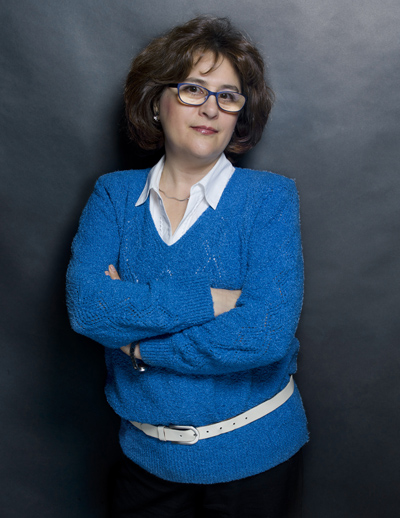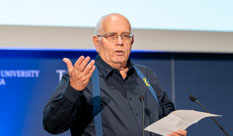More:
News & Stories
"Time to stop buying dolls for girls and trains for boys"
Prof. Alla Zak, Acting Dean of the Faculty of Sciences, talks about the gender bias that causes women to apply less to the technological professions.

Prof. Alla Zak
In the last two months, Prof. Zak celebrated two important career-related events: she was promoted to Full Professor at HIT and a few weeks later, was appointed Acting Dean of the Faculty of Sciences.
In response to the question of 'what professorship means to her”, she replied that it represents a universal recognition of her work on nano tubes, which, according to her, is "super interesting and very important for modern life and society”. Nano-tubes can be applied to alternative energy, artificial intelligence, medicine, and more.
It turns out that nanotubes are capable of reacting to light, generating electricity, remembering signals and recognizing them- four operations in one single nanocrystal, highly suitable to machine learning. "I am very proud of my nano-tubes and I'm delighted that my academic peers, and the Council for Higher Education, granted me this hard-earned promotion.”
Prof. Zak is the fourth female Dean currently serving at HIT, thus making HIT an academic institution with a majority of women heading independent faculties and departments.
Although she is aware of the relatively small number of female students in the technological faculties, especially in Physics and Chemistry, she says that in her opinion, having four female deans is nothing out of the ordinary, given the high capabilities of women in the field.
"I understand why there is global concern as to the status of women in STEM disciplines, because discrimination does exist, and awareness to this phenomena is important. Still, this is not the only reason for the dearth of women in technological professions. Even if we disregard the discrimination issue, gender bias from an early age impacts on the choice women make in choosing technological professions" she says. "Perhaps this situation will change if, from childhood, they'll stop buying dolls for girls and trains and cars for boys. Both genders have talented people, and the gender bias does injustice to girls from an early age. Who said that men are necessarily more technology-oriented than women?" she asks.
Prof. Alla Zak heads the Laboratory for Research and Synthesis of Nanomaterials at HIT, and is considered a world expert in this field. Born and raised in Chișinău, Moldova, her father was an engineer and her mother, a chemist: "In Russia, scientific subjects were mandatory in matriculation exams, so women were exposed to them at school age."
Prof. Zak earned her first and second degrees in physics in her hometown, where she was exposed to anti-semitism at its full force. She explains: “In university entrance exams, Jewish candidates were always required to solve complex equations in which a built-in error had been introduced, in order for them to fail.” Faced with similar treatment, a young Alla Zack stood her ground before the Institution's management, and despite the adversities, was admitted to higher studies. During her studies, Prof. Zak worked at a research institute in Chisinau until she immigrated to Israel in 1990.
In Israel, she initially taught physics in high schools and in later stages , earned her Ph.D. in materials science and nanotechnology at the Weizmann Institute of Science. Immediately after completing her Ph.D., she served as Chief Scientist in a startup company dealing with Nano- materials.
Two years ago, Prof. Zak, together with researchers working in her Laboratory, published an important article in the well-respected, peer-reviewed journal ACS NANO. There, she shared a solution for the production of a special material belonging to the nano-materials family, and also addressed many other ‘unknowns’, some of which were unsolvable for the past 25 years.
Prof. Alla Zak is currently collaborating with scientists from Italy on an innovative project which develops wearable solar-charged batteries for soldiers in the battlefield. The project is funded by NATO.
Prof. Zak is a mother of two sons who, according to her, played an important role in her success. She lost her eldest son, a gifted painter and rising star in the art world, under tragic circumstances about 15 years ago.
Prof. Zak is married to Prof. Reshef Tenne, Professor Emeritus in the Faculty of Chemistry at the Weizmann Institute of Science. Prof. Tenne is the recipient of many distinguished awards for his scientific work, and is a member of the National Academy of Sciences. The couple often lecture at international conferences and co-author articles.
Posted: 31/10/2022
- News & Events
New Collaboration with Sheba Medical Center will qualify nurses to work in a digital environment.
Collaboration between HIT Holon Institute of Technology, the teaching authority of the Sheba Medical Center, and the Sheba-BEYOND virtual hospital will allow training nurses in Israel and around the world to work in a digital...



 Additional programs
Additional programs
